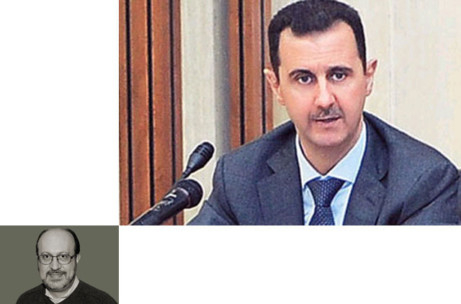
Just a few weeks before the planned Geneva international conference on Syria, President Bashar Al Assad granted an Argentine newspaper a major interview, in which he talked about negotiations. Although his prime minister was expected to attend the Swiss pow-wow and while Damascus dropped a long-standing demand that the armed opposition lay down its weapons before any negotiations were held, chances were excellent that little would change on the ground.
In Geneva, UN Secretary-General Ban Ki-Moon was likely to moderate a day-long affair in the shadow of continued confrontations, simply because the Syrian president was not ready to compromise. Doing so, he believed, placed his regime in mortal danger. In fact, Al Assad told his interviewers that he doubted mediation could settle the conflict, adding: “There is confusion in the world between a political solution and terrorism. They think a political conference will halt terrorists in the country. That is unrealistic,” which further revealed his hand.
In the event, the Syrian leader depicted his country’s crisis as a deadly war not because of his army’s and security forces’ doing, but because of international interference, led by evil western powers. A bold Al Assad claimed that President Barack Obama was reluctant to intervene further not for any principles he held, but due to severe financial constraints and, perhaps, a lack of an opportunity for Washington to advance its regional interests.
Adamant in his steadfastness, the Syrian dictator declared that he was not ready to stand down to save his mortally wounded nation, as he insisted that he would “face his duty,” remain in his elected position and accept an anticipated 2014 election victory to serve yet another term as head of state. Insurgent groups, avowed Al Assad, wanted to unseat him and said that peace talks made no sense because the opposition was too fragmented to negotiate an agreement. “No dialogue with terrorists,” he contended, which meant that realistically speaking, one could only see two endings to the civil war: Either Al Assad manages to win and regains full control over Syria or he is thrown out of power — in exile or otherwise. It will be wise to assume that Al Assad will not be ready to agree to the second option.
To be sure, the western demonising may be easing, even if fashionable punditry — that Washington, London and Paris finally realised that they cannot force Al Assad’s ouster quickly — was excessively optimistic. Some saw opposition setbacks as signs of the Syrian Arab Army’s prowess. Others predicated that victory was round the corner, allegedly because the revolution was false or adding insult to injury because extremists manipulated by Al Qaida hijacked it. Few had the honesty to acknowledge that there were no extremists in Daraa, Hama and Homs in early to mid-2011 when the initial uprising — that drew succour from the overall Arab Spring phenomenon — was peaceful and asked for genuine political reforms. Even fewer recognised that the regime lost its moral compass by imprisoning, torturing and killing men, women and children at will, as they highlighted undeniable opposition acts of barbarity but conveniently shied away from equally barbaric behaviour attributed to what pretended to be disciplined forces.
Instead, naive voices clamoured on the Syrian National Coalition — a largely ineffective group that hoped to democratise a hopelessly divided nation — to drop its demand that Al Assad leave power. They pointed to an alleged change of heart in Washington to that effect, even if no such transformation occurred. Rather, coalition backers led by Qatar, Saudi Arabia, Jordan and Turkey, and much less by western powers, were reluctant to turn up the heat, unsure of the direction that their actions might create.
Under the circumstances, revolutionary leaders have finally understood that they are more or less alone and that this is their fight, not that of other Arab nations, or of western powers. Indeed, even the joint Franco-British alliance that earlier made lofty promises, has hesitated to lift the European arms embargo, ostensibly because it is not sure in whose hands such weapons will fall.
A poised and rested Al Assad spoke with assurance in the latest television interview and he was far less uncertain than many assumed. He pursues a long-term strategy that will see him run and win the 2014 presidential elections, something that borders on the hilarious given the overall destruction imposed on what was once a great nation. Still, the fear, and the Baath regime’s trump card, was the very nature of the successor government to prevent a political vacuum. Damascus insisted that it was in a position to prevent fragmentation, the rise of Salafist-dominated extremists and, perhaps, a prolonged bloody confrontation stretching for years on end. Regrettably, a disintegration of the state, the growth of hardline elements and unending violence are now Syria’s realities.
Al Assad is ready to stay put long after the next Geneva conference since he knows that one congress will not a lasting peace make. Even if he is aware that he now rules over a shattered nation, his insistence on a putative victory effectively means there is no hope for a negotiated settlement that, while a laudable goal, is an ephemeral wish.
Dr Joseph A. Kechichian is the author of Legal and Political Reforms in Saudi Arabia (Routledge, 2012).








